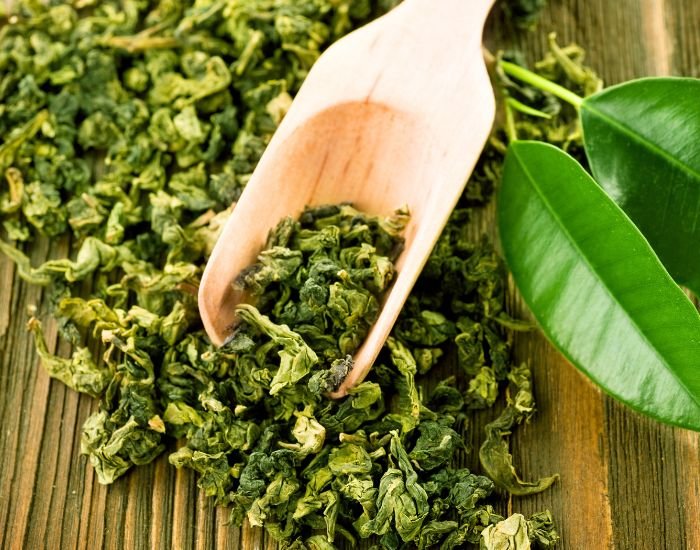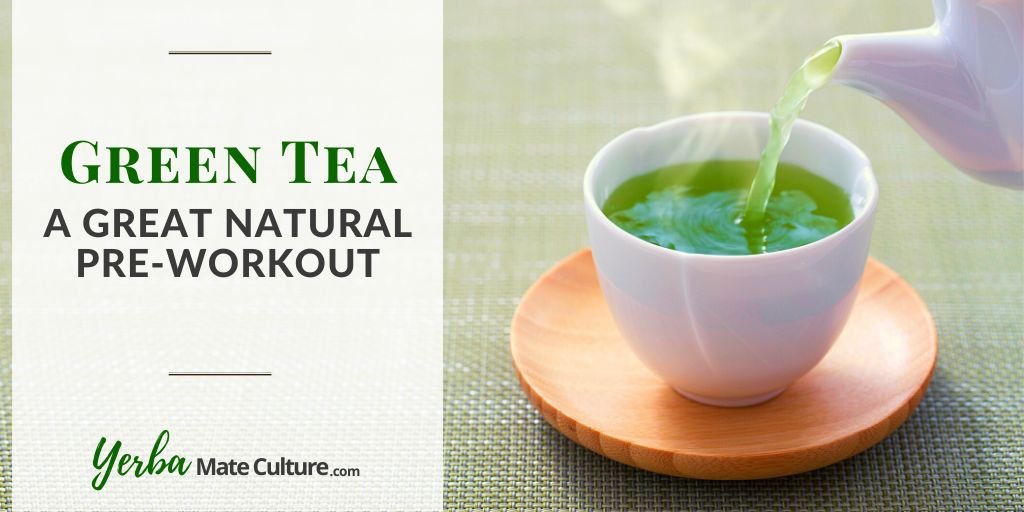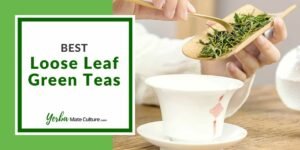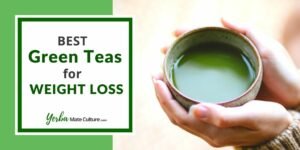Pre-workout supplements have become a necessary part of the workout equation for many people. They promise to provide more focus, more strength, and more energy.
However, many of these products contain synthetic ingredients and stimulants that bring with them unwanted side effects. As a result, many gymgoers have sought out natural alternatives that can provide the energy and endurance boost they need without the drawbacks.
A natural pre-workout option that has gained popularity recently is green tea. There are a number of active ingredients in green tea that have been found to boost exercise performance, making it a for people who want a natural safe pre-workout.
In this article, we’ll explore the benefits of a green tea pre-workout.
What Makes Green Tea Special?
Ever since its discovery in East Asia, green tea has been valued for its therapeutic benefits. It is made from freshly selected Camellia sinensis plant leaves that are heated to prevent oxidation and preserve the plant’s natural chemicals and antioxidants.

Green tea has been used for many years to treat a range of conditions, including inflammation, increasing digestion, and mental clarity. It comes in a variety of forms, each of which has unique characteristics depending on where, how, and under what conditions it was grown.
Sencha, Matcha, and Gyokuro are some of the most well-known kinds of green tea:
- Japan’s most popular green tea, sencha, has a gentle, somewhat sweet flavor.
- The brilliant green color and robust flavor of matcha, which is produced from finely ground green tea leaves, are its most distinctive features.
- Gyokuro, which has a sweet and delicate flavor, is regarded as one of the highest-quality green teas.
How Does Green Tea Work as a Pre-Workout?
There are a number of ways green tea can serve as a pre-workout supplement.
First off, green tea contains caffeine, a natural stimulant that can help boost vigor and concentration when exercising. Due to its proven ability to increase mental alertness, decrease fatigue, and improve endurance, caffeine is a common ingredient in pre-workout supplements.

Green tea also contains theanine. This amino acid has been demonstrated to have a calming impact on the mind and body. People who suffer jitters or trembling while consuming caffeine alone may find theanine to be very helpful in reducing stress and anxiety.
Green tea’s caffeine and theanine content contribute to a balanced, sustained increase in energy and attention.
The antioxidant content of green tea also contributes to its effectiveness as a pre-workout. One of the key classes of antioxidants in this beverage is catechins. These compounds have been shown to reduce inflammation, improve heart health, and boost fat metabolism. This combination can enhance workout performance by reducing delayed onset muscle soreness (DOMS), boosting circulation, and increasing fat burn.
Overall, the combination of caffeine, theanine, and antioxidants in green tea can provide a natural and effective pre-workout boost in energy, focus, and endurance.
Evidence Supporting the Use of Green Tea as a Pre-Workout
The effects of green tea on exercise performance have been the subject of quite a bit of research.
One study, published in the Journal of the International Society of Sports Nutrition, indicated that giving trained athletes green tea extract 30 minutes before exercise significantly improved their endurance, power, and fat oxidation. [1]
Another study found that green tea supplementation increased aerobic capacity and reduced body fat in inactive women, according to research published in the British Journal of Nutrition. According to these studies, green tea may be a useful all-natural pre-workout supplement for enhancing athletic performance. [2], [3]
In addition to the direct workout performance benefits of green tea, it can also be combined with other natural ingredients for even greater benefit. For instance, it has been demonstrated that combining green tea with creatine, a naturally occurring substance present in meat and fish, increases muscle strength and power output during exercise. [4], [5]
It has also been demonstrated that combining green tea with beta-alanine, another natural amino acid, increases muscle endurance and postpones exhaustion during intense exercise. According to these studies, green tea can be used with other organic products to increase its pre-workout advantages. [6]
How to Use a Green Tea Pre-Workout
It’s important to consider the timing and dose of consumption when taking green tea as a pre-workout supplement.
Here are some guidelines:
Timing: Green tea should be consumed 30 to 60 minutes before working out. This gives the active components in green tea enough time to enter the body and begin doing their job.
Dosage: The best amount of green tea to take as a pre-workout supplement depends on a variety of factors, including body weight, sensitivity to caffeine, and personal tolerance. The most common recommendation is to take 200–400 mg of green tea extract, which is equal to 2-4 cups of brewed green tea.
Preparation: Use premium loose-leaf green tea or green tea extract powder while making green tea as a pre-workout supplement. Drink the tea after allowing it to steep in boiling water for two to three minutes. A smoothie or other pre-workout beverage can also be made with green tea extract powder added to it.
If you want an easy option, consider a product like Kirkland matcha green tea that comes in handy tea bags and combines the Sencha and Matcha green teas into one product.
Looking for a beginner weightlifting routine? Here’s a super effective 12-week routine, complete with video demonstrations.
Comparison with Other Natural Pre-Workouts
Green tea extract is a popular natural pre-workout supplement, but it’s not the only one available.
Here is a comparison of green tea extract with other natural pre-workouts:
1. Caffeine
Found in coffee, tea, and many energy drinks, caffeine is one of the most popular natural pre-workout supplements. Caffeine, like green tea extract, can increase stamina, mental clarity, and endurance while exercising. Nevertheless, jitters, anxiety, and a crash after the effects wear off are some of the negative effects of caffeine. For those who need a longer-lasting energy boost or are sensitive to caffeine, green tea extract might be a better option.
2. Creatine
Studies have shown that creatine, a natural substance present in meat and fish, increases muscle strength and power production during exercise. For endurance sports like running or cycling, creatine might not be as helpful. [7]
As pre-workout supplements, both green tea and creatine have unique advantages. Green tea is an excellent option for anyone hoping to increase their energy, attention, and general health, while creatine is the best supplement for people looking to increase their muscle strength, power output, and endurance during high-intensity exercise. Ultimately, which supplement is best for you — green tea or creatine — depends on your preferences, tolerance levels, and overall goals.
3. Beta-Alanine
Beta-alanine is a natural amino acid that has been shown to increase muscle endurance and postpone tiredness during intense exercise. However, in some people, it causes a tingling or itchy feeling in the extremities. If you’re sensitive to beta-alanine, green tea extract may be a better option.
Looking for the best green tea for weight loss? We’ve got you covered.
Just remember to stay away from bottled and canned products like Arizona Green Tea which contain added sugar.
Wrap Up
Green tea is an effective all-natural pre-workout supplement with several advantages for athletic performance. It’s a preferred option among many fitness enthusiasts due to its capacity to boost fat metabolism, lower tension, and anxiety, and increase energy and focus.
Green tea pre-workout is also a risk-free and efficient substitute for other pre-workout supplements that could have unfavorable side effects.
By including it in your pre-workout routine, you can benefit from its many advantages, helping you reach your fitness objectives more quickly.
So, if you’re not already doing so, why not start using a green tea pre-workout today to maximize the effectiveness of your workouts?
References
[1] Xu, J. R., Zhu, W., Motl, R. W., Chen, M. H., & Yan, J. H. (2019). The effect of green tea extract supplementation on exercise-induced oxidative stress parameters in male sprinters. Journal of the International Society of Sports Nutrition, 16(1), 1-8. doi: 10.1186/s12970-019-0329-0
[2] Hursel, R., Viechtbauer, W., & Westerterp-Plantenga, M. S. (2009). The effects of green tea on weight loss and weight maintenance: a meta-analysis. International journal of obesity, 33(9), 956-961. doi: 10.1038/ijo.2009.135
[3] Venables, M. C., Hulston, C. J., Cox, H. R., & Jeukendrup, A. E. (2008). Green tea extract ingestion, fat oxidation, and glucose tolerance in healthy humans. American Journal of Clinical Nutrition, 87(3), 778-784. doi: 10.1093/ajcn/87.3.778
[4] Jäger, R., & Purpura, M. (2007). Comparison of efficacy of creatine and creatine phosphate supplemented beverages on exercise performance. Nutrition, 23(9), 773-776. doi: 10.1016/j.nut.2007.06.011
[5] Bloomer, R. J., Farney, T. M., Harvey, I. C., & Alleman, R. J. (2010). Safety and efficacy of a pre-workout supplement containing caffeine, creatine, and amino acids during three weeks of concurrent, resistance training. Nutrition and Metabolic Insights, 3, 35-42. doi: 10.4137/NMI.S3219
[6] Hoffman, J. R., Ratamess, N. A., Gonzalez, A. M., Beller, N. A., Hoffman, M. W., Olson, M., … & Jäger, R. (2008). The effects of acute and prolonged CRAM supplementation on reaction time and subjective measures of focus and alertness in healthy college students. Journal of the International Society of Sports Nutrition, 5(1), 13. doi: 10.1186/1550-2783-5-13
[7] Rawson, E. S., & Volek, J. S. (2003). Effects of creatine supplementation and resistance training on muscle strength and weightlifting performance. Journal of Strength and Conditioning Research, 17(4), 822-831. doi: 10.1519/00124278-200311000-00002





